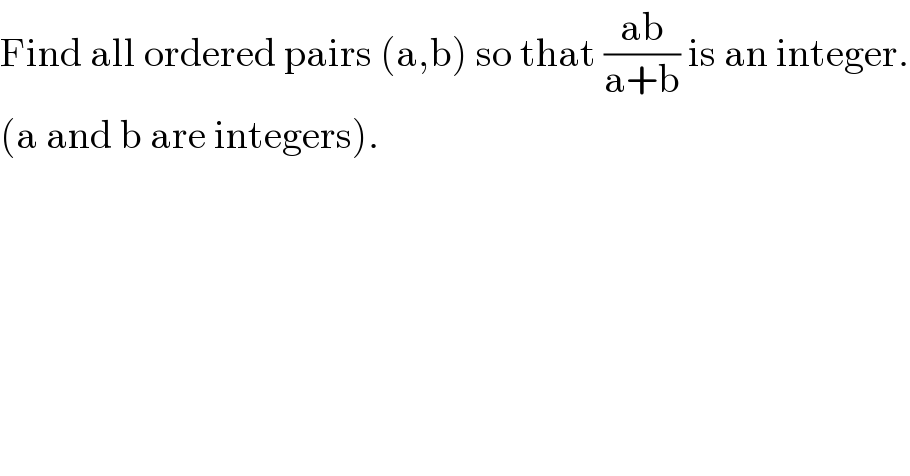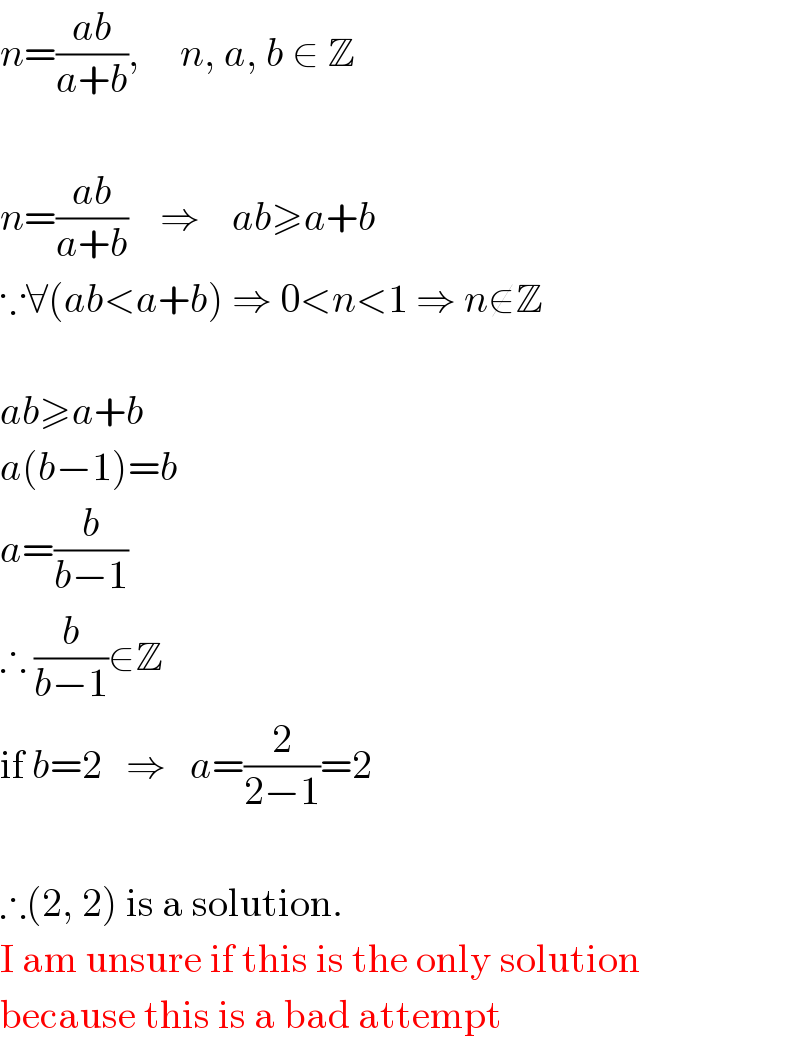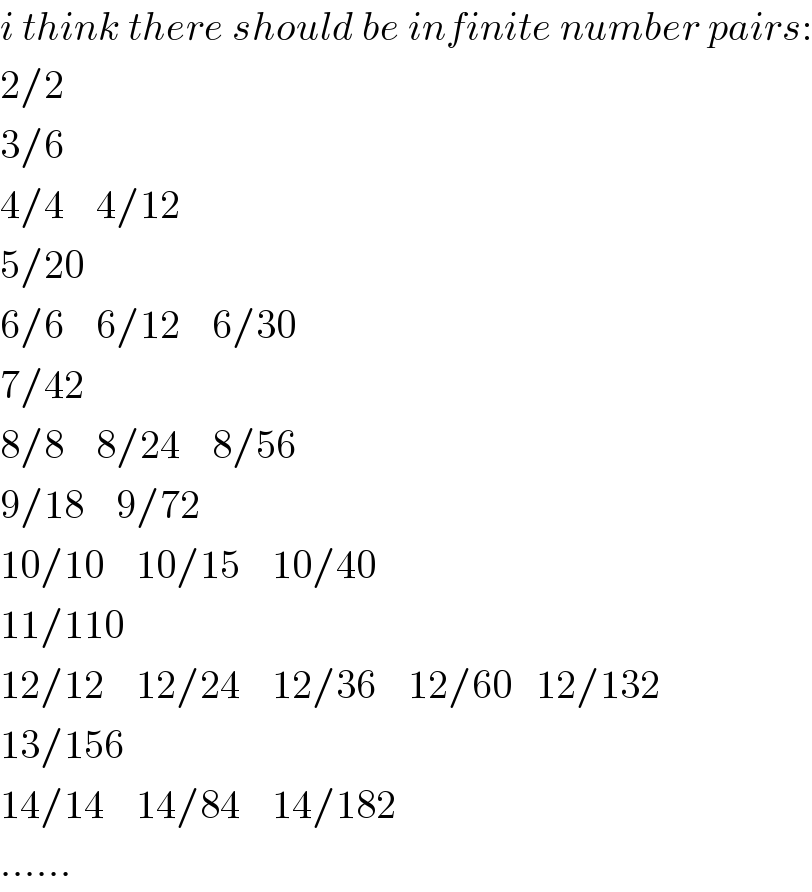
Question Number 10944 by 314159 last updated on 03/Mar/17

$$\mathrm{Find}\:\mathrm{all}\:\mathrm{ordered}\:\mathrm{pairs}\:\left(\mathrm{a},\mathrm{b}\right)\:\mathrm{so}\:\mathrm{that}\:\frac{\mathrm{ab}}{\mathrm{a}+\mathrm{b}}\:\mathrm{is}\:\mathrm{an}\:\mathrm{integer}. \\ $$$$\left(\mathrm{a}\:\mathrm{and}\:\mathrm{b}\:\mathrm{are}\:\mathrm{integers}\right). \\ $$
Commented by FilupS last updated on 03/Mar/17

$${n}=\frac{{ab}}{{a}+{b}},\:\:\:\:\:{n},\:{a},\:{b}\:\in\:\mathbb{Z} \\ $$$$\: \\ $$$${n}=\frac{{ab}}{{a}+{b}}\:\:\:\:\Rightarrow\:\:\:\:{ab}\geqslant{a}+{b} \\ $$$$\because\forall\left({ab}<{a}+{b}\right)\:\Rightarrow\:\mathrm{0}<{n}<\mathrm{1}\:\Rightarrow\:{n}\notin\mathbb{Z} \\ $$$$\: \\ $$$${ab}\geqslant{a}+{b} \\ $$$${a}\left({b}−\mathrm{1}\right)={b} \\ $$$${a}=\frac{{b}}{{b}−\mathrm{1}} \\ $$$$\therefore\:\frac{{b}}{{b}−\mathrm{1}}\in\mathbb{Z} \\ $$$$\mathrm{if}\:{b}=\mathrm{2}\:\:\:\Rightarrow\:\:\:{a}=\frac{\mathrm{2}}{\mathrm{2}−\mathrm{1}}=\mathrm{2} \\ $$$$\: \\ $$$$\therefore\left(\mathrm{2},\:\mathrm{2}\right)\:\mathrm{is}\:\mathrm{a}\:\mathrm{solution}. \\ $$$$\mathrm{I}\:\mathrm{am}\:\mathrm{unsure}\:\mathrm{if}\:\mathrm{this}\:\mathrm{is}\:\mathrm{the}\:\mathrm{only}\:\mathrm{solution} \\ $$$$\mathrm{because}\:\mathrm{this}\:\mathrm{is}\:\mathrm{a}\:\mathrm{bad}\:\mathrm{attempt} \\ $$
Commented by mrW1 last updated on 04/Mar/17

$${i}\:{think}\:{there}\:{should}\:{be}\:{infinite}\:{number}\:{pairs}: \\ $$$$\mathrm{2}/\mathrm{2} \\ $$$$\mathrm{3}/\mathrm{6} \\ $$$$\mathrm{4}/\mathrm{4}\:\:\:\:\mathrm{4}/\mathrm{12} \\ $$$$\mathrm{5}/\mathrm{20} \\ $$$$\mathrm{6}/\mathrm{6}\:\:\:\:\mathrm{6}/\mathrm{12}\:\:\:\:\mathrm{6}/\mathrm{30} \\ $$$$\mathrm{7}/\mathrm{42} \\ $$$$\mathrm{8}/\mathrm{8}\:\:\:\:\mathrm{8}/\mathrm{24}\:\:\:\:\mathrm{8}/\mathrm{56} \\ $$$$\mathrm{9}/\mathrm{18}\:\:\:\:\mathrm{9}/\mathrm{72} \\ $$$$\mathrm{10}/\mathrm{10}\:\:\:\:\mathrm{10}/\mathrm{15}\:\:\:\:\mathrm{10}/\mathrm{40} \\ $$$$\mathrm{11}/\mathrm{110} \\ $$$$\mathrm{12}/\mathrm{12}\:\:\:\:\mathrm{12}/\mathrm{24}\:\:\:\:\mathrm{12}/\mathrm{36}\:\:\:\:\mathrm{12}/\mathrm{60}\:\:\:\mathrm{12}/\mathrm{132} \\ $$$$\mathrm{13}/\mathrm{156} \\ $$$$\mathrm{14}/\mathrm{14}\:\:\:\:\mathrm{14}/\mathrm{84}\:\:\:\:\mathrm{14}/\mathrm{182} \\ $$$$...... \\ $$
Answered by mrW1 last updated on 04/Mar/17

$${let}\:\frac{{ab}}{{a}+{b}}={n} \\ $$$${let}\:{b}\geqslant{a}\:{and}\:{b}={ka}\:\left({k}\geqslant\mathrm{1}\right) \\ $$$$\Rightarrow\frac{{aka}}{\left(\mathrm{1}+{k}\right){a}}={n} \\ $$$${a}=\frac{\mathrm{1}+{k}}{{k}}×{n}={n}+\frac{{n}}{{k}} \\ $$$${with}\:\frac{{n}}{{k}}={i}\:{or}\:{k}=\frac{{n}}{{i}} \\ $$$$\Rightarrow{a}={n}+{i} \\ $$$${b}={ka}=\frac{{n}}{{i}}\left({n}+{i}\right)={n}\left(\mathrm{1}+\frac{{n}}{{i}}\right) \\ $$$${with}\:\frac{{n}}{{i}}={j}\:{or}\:{n}={ji} \\ $$$$\Rightarrow{a}={n}+{i}={ji}+{i}=\left(\mathrm{1}+{j}\right){i} \\ $$$$\Rightarrow{b}={n}\left(\mathrm{1}+{j}\right)={j}\left(\mathrm{1}+{j}\right){i} \\ $$$$ \\ $$$${i}.{e}.\:{the}\:{solution}\:{is} \\ $$$$\begin{cases}{{a}=\left(\mathrm{1}+{j}\right){i}}\\{{b}={j}\left(\mathrm{1}+{j}\right){i}}\end{cases} \\ $$$${i},{j}\in\mathbb{N} \\ $$$$ \\ $$$${e}.{g}. \\ $$$${i}=\mathrm{1},\:{j}=\mathrm{1},\mathrm{2},\mathrm{3},\mathrm{4}... \\ $$$${a}/{b}=\mathrm{2}/\mathrm{2},\:\mathrm{3}/\mathrm{6},\:\mathrm{4}/\mathrm{12},\:\mathrm{5}/\mathrm{20},\:\mathrm{6}/\mathrm{30}...... \\ $$$$ \\ $$$${i}=\mathrm{2},\:{j}=\mathrm{1},\mathrm{2},\mathrm{3},\mathrm{4}... \\ $$$${a}/{b}=\mathrm{4}/\mathrm{4},\:\mathrm{6}/\mathrm{12},\:\mathrm{8}/\mathrm{24},\:\mathrm{10}/\mathrm{40},\:\mathrm{12}/\mathrm{60}...... \\ $$$$ \\ $$$${i}=\mathrm{3},\:{j}=\mathrm{1},\mathrm{2},\mathrm{3},\mathrm{4}... \\ $$$${a}/{b}=\mathrm{6}/\mathrm{6},\:\mathrm{9}/\mathrm{18},\:\mathrm{12}/\mathrm{36},\:\mathrm{15}/\mathrm{60},\:\mathrm{18}/\mathrm{90}...... \\ $$$$..... \\ $$$$ \\ $$$${We}\:{see}\:{in}\:{the}\:{solution}\:{that}\:{a}\:{is}\:{the} \\ $$$${product}\:{of}\:\mathrm{2}\:{numbers}\:{and}\:{b}\:{is}\:{the} \\ $$$${product}\:{of}\:\mathrm{3}\:{numbers}\:{and}\:{b}={a}×{j}. \\ $$$$ \\ $$$${For}\:{every}\:{a}\:\geqslant\mathrm{2},\: \\ $$$${if}\:{a}\:{is}\:{a}\:{prime}\:{number},\:{there}\:{is}\:{one} \\ $$$${corresponding}\:{value}\:{for}\:{b},\:{and} \\ $$$${if}\:{a}\:{is}\:{no}\:{prime}\:{number},\:{there}\:{are}\:{two} \\ $$$${or}\:{more}\:{corresponding}\:{values}\:{for}\:{b}. \\ $$$$ \\ $$$${E}.{g}.\:{a}=\mathrm{7}\:\left({prime}\:{number}\right)\:{which}\:{can} \\ $$$${only}\:{be}\:{expressed}\:{as} \\ $$$$\mathrm{7}×\mathrm{1}\:\:\:\left({j}=\mathrm{6}\right) \\ $$$$\Rightarrow{there}\:{is}\:{only}\:{one}\:{value}\:{for}\:{b}: \\ $$$${b}=\mathrm{7}×\mathrm{6}=\mathrm{42} \\ $$$$ \\ $$$${E}.{g}.\:{a}=\mathrm{12}\:{which}\:{can}\:{be}\:{expressed}\:{as} \\ $$$$\mathrm{12}×\mathrm{1}\:\:\left({j}=\mathrm{11}\right) \\ $$$$\mathrm{3}×\mathrm{4}\:\:\:\left({j}=\mathrm{2}\right) \\ $$$$\mathrm{4}×\mathrm{3}\:\:\:\left({j}=\mathrm{3}\right) \\ $$$$\mathrm{2}×\mathrm{6}\:\:\:\left({j}=\mathrm{1}\right) \\ $$$$\mathrm{6}×\mathrm{2}\:\:\:\left({j}=\mathrm{5}\right) \\ $$$$\Rightarrow{there}\:{are}\:\mathrm{5}\:{values}\:{for}\:{b}: \\ $$$${b}=\mathrm{12}×\mathrm{1}=\mathrm{12} \\ $$$${b}=\mathrm{12}×\mathrm{2}=\mathrm{24} \\ $$$${b}=\mathrm{12}×\mathrm{3}=\mathrm{36} \\ $$$${b}=\mathrm{12}×\mathrm{5}=\mathrm{60} \\ $$$${b}=\mathrm{12}×\mathrm{11}=\mathrm{132} \\ $$$$ \\ $$$${the}\:{pairs}\:{of}\:{a}\:{and}\:{b}\:{for}\:{a}\:{from}\:\mathrm{2}\:{till}\:\mathrm{14} \\ $$$${see}\:{comment}\:{above}. \\ $$
Commented by FilupS last updated on 04/Mar/17

$$\mathrm{I}\:\mathrm{Tried}\:\mathrm{a}\:\mathrm{slimilar}\:\mathrm{subtitution},\:\mathrm{but}\:\mathrm{couldnt} \\ $$$$\mathrm{work}\:\mathrm{with}\:\mathrm{it}.\mathrm{Awesome}\:\mathrm{job} \\ $$
